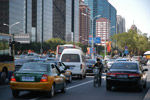 A study by researchers at Royal Holloway, University of London, University College London and Oxford University, has found that a genetic variant which reduces the chance of contracting diseases such as tuberculosis and leprosy is more prevalent in populations with long histories of urban living. The results are published in the journal ‘Evolution.’
A study by researchers at Royal Holloway, University of London, University College London and Oxford University, has found that a genetic variant which reduces the chance of contracting diseases such as tuberculosis and leprosy is more prevalent in populations with long histories of urban living. The results are published in the journal ‘Evolution.’
Poor sanitation and high population densities would have provided an ideal breeding ground for the spread of disease in ancient cities. But the research suggests that past exposure to pathogens led to disease resistance spreading through populations, with our ancestors passing this onto their descendants.
To test the theory, Dr. Ian Barnes from the School of Biological Sciences at Royal Holloway and Professor Mark Thomas from the Department of Genetics, Evolution and Environment at UCL, analyzed DNA samples from 17 different human populations living across Europe, Asia and Africa. They also searched the archaeological and historical literature in order to determine the oldest recorded data for the first city or other urban settlement in these regions. By comparing rates of genetic disease resistance with urban history, they showed that in the areas with a long history of urban settlements, today’s inhabitants were more likely to possess the DNA variant which provides some resistance to infection.
“The method we have employed here makes novel use of historical and archaeological data, as a means to explain the distribution and frequency of a genetic variant, and to identify a source of natural selection”, explains Dr Barnes.
The results show that the protective variant is found in nearly everyone from the Middle East to India and in parts of Europe where cities have been around for thousands of years.
Dr Barnes adds: “This seems to be an elegant example of evolution in action. It flags up the importance of a very recent aspect of our evolution as a species, the development of cities as a selective force. It could also help to explain some of the differences we observe in disease resistance around the world.”
Professor Thomas says population density seems to play an important role in shaping so many aspects of our species. He said: “It was a vital factor in our species maintaining the complex skills and culture that distinguish us from other primates. It drove many of the genetic differences we see today between different populations from around the world. And now, it seems, it also influenced how infectious diseases spread in the past and how we evolved to resist those diseases.”
Material adapted from Royal Holloway, University of London.
Reference
ANCIENT URBANISATION PREDICTS GENETIC RESISTANCE TO TUBERCULOSIS. Ian Barnes, Anna Duda, Oliver Pybus and Mark G. Evolution. Thomas. Accepted manuscript online: 14 SEP 2010 07:46AM EST | DOI: 10.1111/j.1558-5646.2010.01132.x http://onlinelibrary.wiley.com/doi/10.1111/j.1558-5646.2010.01132.x/abstract
No comments yet.